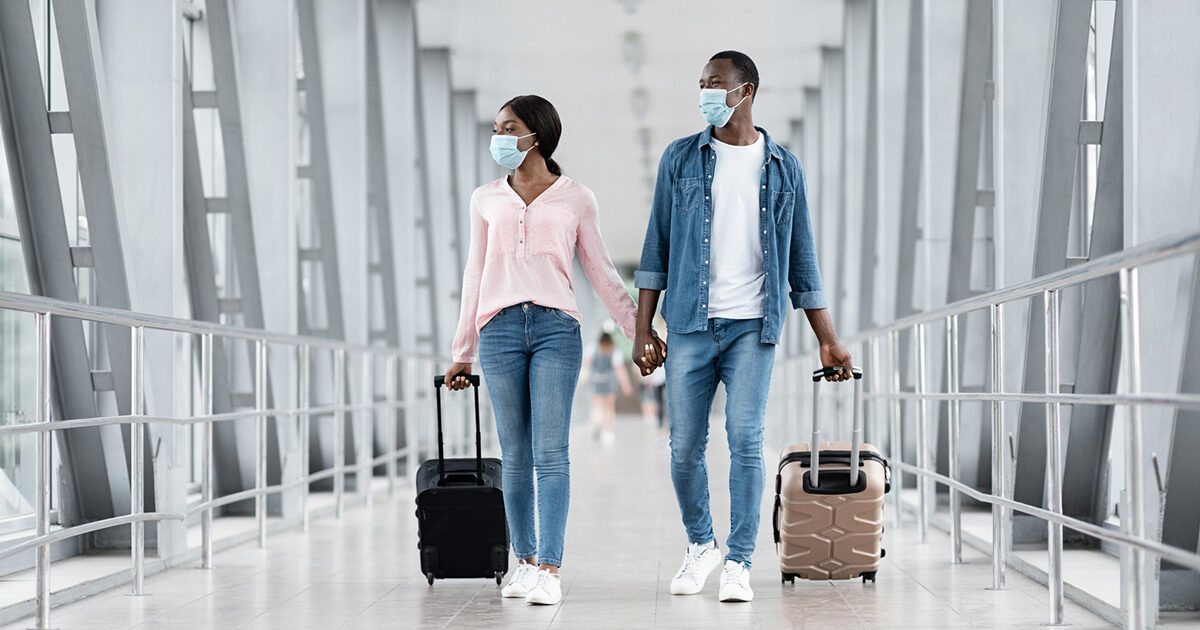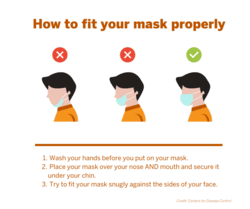7 Tips to Protect Your Health During Holiday Air Travel
Simple strategies to help minimize illness while traveling this holiday season
Reviewed by: Paul S. Mueller, MD, MPH, FACP
Written by: Ashley Lawrence

As the holiday season approaches, many of us eagerly anticipate reconnecting with loved ones, exploring new destinations, and creating lasting memories. However, with the increase in travel volume, there is also a heightened risk of exposure to respiratory illnesses such as COVID-19, influenza (flu), and respiratory syncytial virus (RSV). Amid this “tripledemic,” it’s more important than ever to prioritize your health while traveling.
With millions of travelers crowding airports, the risk of infection on airplanes rises due to the close quarters passengers share for hours at a time. By taking a few simple precautions, travelers can significantly reduce their chances of getting sick this holiday season. Here are seven tips to help you stay healthy and safe, ensuring you arrive at your destination ready to enjoy the season’s festivities.
1. Stay Up to Date on Vaccinations
Vaccinations are one of the most effective ways to protect yourself from severe illness. COVID-19 and flu vaccines are especially critical for older adults and individuals with underlying conditions such as diabetes, heart disease, or lung disease.
Before traveling, make sure your vaccinations are current. Consult your primary care provider or a local pharmacy about getting vaccinated if you haven’t already.
Learn more about seasonal vaccines.
<br>2. Avoid Crowded Areas When Possible
Airports and busy travel hubs can be hotspots for germs. While airplane filtration systems are highly effective, the crowded conditions in airport terminals pose a higher risk.
Minimize time spent in crowded spaces by:
- Checking in online to avoid lines
- Arriving at the airport during off-peak hours, if possible
- Keeping distance from others, especially those who appear unwell
- Staying home if you’re feeling sick to prevent spreading illness to others

3. Wear a Mask
Even though most airlines and airports no longer mandate mask use, masks remain a powerful tool to protect against respiratory illnesses. N95 masks provide the best protection, but a well-fitted surgical mask is also a good alternative.
Consider wearing a mask in crowded areas such as security lines, boarding gates, and during the flight, especially if you’re at higher risk of infection, complications, or prolonged close contact with others.
4. Practice Good Hand Hygiene
Regular handwashing can significantly lower your risk of picking up and spreading germs. Wash your hands with soap and water for at least 20 seconds, especially after touching high-contact surfaces such as security bins, door handles, or seatback trays.
Additionally, carry hand sanitizer containing at least 60% alcohol for situations where handwashing isn’t possible. Don’t forget to disinfect frequently touched items such as your phone, travel documents, armrests, and seatbelts. Good hand hygiene not only protects you but also helps prevent the spread of germs to others.
5. Stay Hydrated and Rested
Travel can take a toll on your immune system. Staying hydrated and getting enough rest are often overlooked but essential for maintaining your body’s defenses. Drink plenty of water throughout your trip and aim for a full night’s sleep before your flight. A well-rested body is better equipped to fight off potential infections.
Learn more about your immune system and how it works.
<br>6. Pack a Travel Health Kit
Having a health kit on hand can help you respond quickly to minor illnesses or symptoms.
Items may include:
- Masks (N95 or surgical)
- Hand sanitizer and disinfectant wipes
- Tissues
- Over-the-counter medications for headaches, cold symptoms, or upset stomachs
7. Monitor Your Health
If you begin feeling unwell during or after your trip, it’s important to act quickly to reduce the risk of spreading illness to others. Symptoms such as fever, cough, or fatigue may indicate the onset of an illness. Isolate yourself and consult a healthcare provider to determine the best course of action.
Taking proactive steps to safeguard your health can help ensure you stay healthy and make the most of your travels this holiday season. Whether it’s practicing good hygiene, following safety protocols, or staying informed about travel requirements, these simple steps can make a big difference in keeping you and your loved ones healthy and safe.
Safe travels and happy holidays!
<br>For more information about UT Health Austin or to request an appointment, call 1-833-UT-CARES (1-833-882-2737) or visit here.